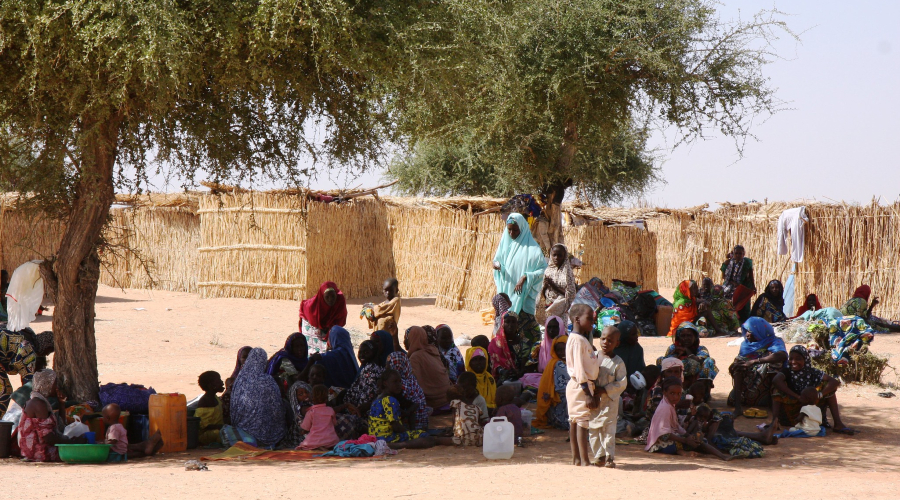Contextualizing the Nigerian Government’s Forced Abortion Program
The unprecedented campaign is a test of the Biden administration's commitment to addressing conflict-related sexual violence.

Published by The Lawfare Institute
in Cooperation With

Editor’s Note: Sexual violence in war takes many forms. In Nigeria, the government is forcing women impregnated by Boko Haram to have abortions, which the University of Denver’s Hilary Matfess and Georgetown’s Robert Nagel argue is unprecedented in both its nature and its scale. They examine this brutal program and other forms of state-sponsored sexual violence during war to highlight opportunities for the Biden administration to hold the Nigerian government accountable.
Daniel Byman
***
In December 2022, Reuters released a shocking report detailing a forced abortion campaign by the Nigerian government that targeted women who were impregnated by members of Boko Haram. The report suggests that the program involved at least five hospitals and five military bases and affected roughly 10,000 women over the course of nearly a decade, which would almost certainly require a degree of oversight and endorsement by senior authorities in the Nigerian government. The accounts from women who were subjected to these forced abortions are harrowing; they reported being given pills or injections to induce abortions without understanding what effect the treatment would have. The program was reportedly justified as a means of eradicating the threat of future insurgents and operated despite Nigeria’s strict regulations on abortion. The Nigerian government has denied these allegations. But in a conflict that has been marked by distressing levels of gender-based violence—including the abduction of women and girls into the ranks of the insurgents—the report added another dimension of systematic state violence against Nigerian women.
In the context of an armed conflict, Nigeria’s program of forced abortions is unprecedented in both its nature and its scale. Though many discussions of sexual violence suggest a degree of inevitability to such violence during war and point a finger at non-state armed groups as perpetrators, reams of academic research underscore that this is a misconception. In fact, in some conflicts, neither government forces nor non-state armed groups engage in sexual violence against civilians. According to the available research, government forces are more likely than non-state armed groups to engage in sexual violence during conflicts—but only 30 percent of state militaries do so. The Nigerian program is unusual. According to the Sexual Violence in Armed Conflict (SVAC) data set, there have been only three other reported instances in which government forces have perpetrated forced abortions in armed conflicts between 1989 and 2021. We also know of several other instances of forced sterilization campaigns that have taken place outside of the context of armed conflict, including in the United States and China. Examining these programs makes it clear how much of an anomaly the Nigerian abortion program is in terms of its scale and institutionalization relative to other state-sponsored programs of sexual violence.
By examining the patterns of state-sponsored sexual violence during war and the ways in which governments have been held responsible for their use of sexual violence against civilians, we can better understand how accountability for such violence can be pursued in Nigeria. Attaining justice for the victims of the campaign will require concerted advocacy and international pressure—making it a significant early test of the Biden administration’s pledge to address conflict-related sexual violence and an opportunity to support Nigerian activists demanding accountability.
Patterns of State-Sponsored Sexual Violence During War
The most common form of sexual violence in wartime is rape. According to the SVAC data project, over the past 30 years, the most common perpetrator has been state forces—though this data set does not collect instances of intimate partner sexual violence. Sexual violence, and rape in particular, may often occur as a practice (meaning a tolerated action, rather than one endorsed by an organization’s leaders). The type of government, its institutional makeup, and mechanisms of accountability also play a significant role in deterring or enabling sexual violence.
In some conflicts, commanders have ordered and promoted the systematic rape of women as part of ethnic cleansing and genocidal campaigns. In the 1990s, Serbian rape camps of Bosnian women put a spotlight on the issue. Yet examples stretch from Soviet soldiers raping millions of German women at the end of World War II, to the campaign of genocidal rape carried out by Pakistan’s military during Bangladesh’s Liberation War in 1971, to the recent campaign by the Tatmadaw against the Rohingya in Myanmar.
According to the SVAC data, forced abortions have been rare and all perpetrated by state militaries. While the Revolutionary Armed Forces of Colombia (FARC) enforced abortions within their own ranks, they did not impose the policy on women outside of the armed organization. Only state forces have been reported as responsible for aborting pregnancies of civilians.
Documented State Violence Against Pregnant Women
The only recorded instances of forced abortion in the SVAC data set at the hands of state forces occurred in Haiti in 1993, Serbia in 1999, and Colombia in 2003. These cases appear to have been isolated incidents by individual perpetrators, unlike the institutionalized, widespread program in Nigeria.
In Haiti, a Human Rights Watch report noted that, amid other forms of sexual violence, a group of soldiers beat a pregnant woman in the abdomen so that she would miscarry. Members of a women’s rights organization recounted another assault in which a woman who was beaten by a group of soldiers was told, “We’ll beat you until you can’t have kids, until you can’t have kids like yourself [militant].”
In Serbia, Human Rights Watch reported that a pregnant woman was kicked by Serb paramilitary members until she lost her child. Additionally, a State Department report found that “during one incident of a mass rape in Berlenitz, while some women and girls were being raped, other pregnant women had their stomachs cut open with knives, with the fetuses then being skewered by the soldiers’ knives.”
In Colombia, Amnesty International reported that soldiers from the XVIII Brigade raped and killed a pregnant teenager, and then cut open her abdomen to retrieve and then murder her fetus.
There is no precedent for Nigeria’s systematic abortion campaign in the extant cross-national data on sexual violence during conflict. The closest comparisons would be instances of states that have engaged in massive sterilization campaigns outside of conflict contexts. In Peru, roughly 200,0000 women were sterilized by the state between 1996 and 2001. Many of these women were poor and indigenous and did not give informed consent for the procedure. During the 1975 Emergency in India, more than 6 million poor men were forcibly sterilized. According to the BBC, “there were reports of police cordoning off villages and virtually dragging the men to surgery.”
In China, as a part of its repression of the Uyghur and other minority populations, the government has curtailed women’s reproductive rights; the Associated Press reported in 2020 that the government “regularly subjects minority women to pregnancy checks, and forces intrauterine devices, sterilization and even abortion on hundreds of thousands.” As a result, birth rates in Uyghur regions plummeted by more than 60 percent from 2015 to 2018. The United States also has an ignominious history of forced sterilization campaigns, which have targeted minority communities, prisoners, and disabled individuals. In 2020, whistleblowers alleged that forced sterilizations were occurring in ICE detention centers.
As these brief vignettes underscore, the Nigerian mass abortion program is notable for the degree of institutionalization, how forced abortions were induced, and its conflict context. In spite of the Nigerian government’s denials about the existence of such a program, these characteristics suggest that the government had a policy of forced abortion. Because of the implied top-down endorsement of this program, high-level officials can and should be held responsible for these violations.
Holding States Accountable
Recent years have demonstrated that it is possible to hold elite officials accountable for government-perpetrated sexual violence, both in the context of war and when the country is at peace, but that doing so can be a long and difficult process. Accountability for such acts requires tenacious and brave activists and, even with their dedicated advocacy, can still take decades to achieve.
In Peru, survivors and families of victims of forced sterilization are still fighting for justice, even though some started legal proceedings as early as 1998 while the sterilization campaign was still ongoing. Multiple investigations into the former dictator, Alberto Fujimori, by Peruvian prosecutors were closed first because Peru’s penal code did not cover forced sterilizations and later because of allegedly insufficient evidence.
After more than two decades of indigenous women’s organizing and pressure from international groups such as Amnesty International, the Peruvian government opened public hearings on the topic in 2021. Despite this arduous road, survivors have renewed hope because of the hearings and legislative changes that entitle victims to medical, financial, and educational reparations.
In 2016, former Chadian dictator Hissène Habré was convicted of multiple crimes against humanity, including rape and sexual slavery by the Extraordinary African Chambers in Senegal. UN Women noted that women’s mobilization was integral to his conviction; their statement recalled that “the original indictment of Habré did not include charges relating to sexual violence” and noted that it was “through persistent witness testimony, [that] these crimes became a central feature of this trial.” Mobilization by civil society, in partnership with the bravery of the women who came forward, was critical in obtaining his conviction.
In the Republic of The Gambia, allegations of sexual violence have been made against the country’s former president. The country’s Truth, Reconciliation and Reparations Commission recently “found that former President Yahya Jammeh and other senior government officials (including senior security officials and government ministers) subjected women and girls to a range of sexual violence including rape, sexual assault, sexual harassment and sexual exploitation, with impunity.” Whether and how the former dictator and his allies will be held to account for these violations—and other crimes committed during his time in office—remains to be seen. The distribution of reparations to Gambian citizens victimized by Jammeh’s policies has reportedly been uneven and incomplete.
These examples of hard-won and partial victories underscore the difficult road ahead for women in Nigeria seeking accountability for the state’s system of forced abortion. Mobilization by civil society and the international community can help pressure the government to conduct a thorough investigation into who authorized this program and ensure that the perpetrators have their day in court.
Feminist activists in Nigeria have called on the Nigerian National Human Rights Commission to determine who is responsible and culpable for the program. They proclaimed, “We, Nigerian feminists, call on the National Human Rights Commission to make public their plans to take this investigation forward, expand its remit to look at the killings of children, and commit to doing so in a victim-centred way.” The statement also called for the decriminalization of abortion in the country, which is currently prohibited except to save the life of the mother.
The wrenching revelations about sexual violence in Nigeria provide an opportunity for the Biden administration to demonstrate its commitment to the Presidential Memorandum to Promote Accountability for Conflict-Related Sexual Violence (CRSV) signed in November 2022, which aims to ensure consequences for incidents like these and deter future acts. As a part of this effort, the State Department will “aim to give a total investment of $10 million over the next two years to projects that investigate and document acts of CRSV.” The Biden administration should support the special panel launched by the Nigerian National Human Rights Commission to demand accountability for the human rights violations alleged by the Reuters report.






